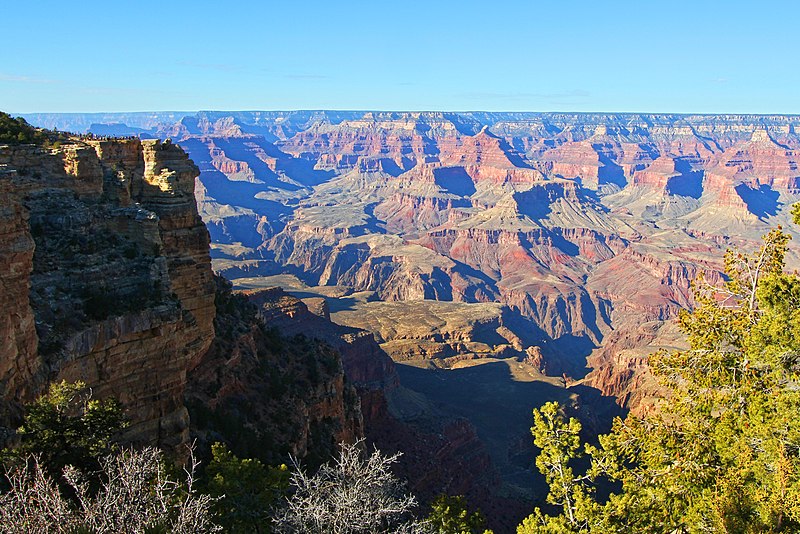
Maya Tilousi, a member of the Hopi Tribe, Havasupai Tribe of Grand Canyon, and the Cheyanne and Arapaho Tribes, shakes hands with President Biden after introducing him at Red Butte
Airfield, 25 miles south of Tusayan, Ariz., on Tuesday.
President Biden has designated a new national monument near the Grand Canyon on Tuesday. This action safeguards lands that hold great significance for indigenous peoples and permanently prohibits new uranium mining claims in the region. The designation encompasses almost 1 million acres.
The president delivered remarks at the Historic Red Butte Airfield in Arizona prior to signing the proclamation and visiting the Grand Canyon.
"Our nation's history is embedded in our people and our lands," Biden stated. "Today's action will safeguard and preserve that history, as well as these elevated plateaus and profound canyons."
The announcement on Tuesday is part of a journey that encompasses New Mexico and Utah, where Biden is presenting his approach to addressing the climate and economic challenges faced by Western Americans.
President Biden signed a proclamation designating the Baaj Nwaavjo I'tah Kukveni Ancestral Footprints of the Grand Canyon National Monument. In the Grand Canyon region, tribal nations and conservationists have long been advocating for additional protections, as noted in reporting by KNAU's Ryan Heinsius.
A recent statewide poll exhibited broad support for the proposal, although local ranchers who have cultivated the land for generations hold concerns. Senior administration officials informed reporters that the national monument designation upholds private property rights and does not affect existing uranium mining claims.
New national monument comes after more than a decade of advocacy by Native nations Nonetheless, Interior Secretary Deb Haaland, the first Native American Cabinet secretary, hailed Biden's move as "historic."
"It will contribute to the safeguarding of lands that numerous tribes consider their eternal home, a place of healing and spiritual nourishment," she remarked. "It will ensure that indigenous communities can continue using these areas for religious rituals, hunting, gathering plants, medicines, and other resources, including some found nowhere else on Earth. It will protect objects of historical and scientific significance for the welfare of tribes, the public, and future generations."
Haaland referred to her own visit to the area in May as "one of the most meaningful trips of my life."
Biden Establishes National Monument Honoring Emmett Till and his Mother The newly established national monument will be known as the Baaj Nwaavjo I'tah Kukveni Grand Canyon National Monument. According to the Grand Canyon Tribal Coalition, which proposed the monument, "Baaj Nwaavjo" translates to "where tribes roam" in Havasupai, while "I'tah Kukveni" means "our ancestral footprints" in Hopi.
Biden's Broader Agenda During his presidency, Biden has established four other national monuments — one commemorates Emmett Till, and the others safeguard land in Nevada, Texas, and Colorado.
However, the significance of Biden's journey to the Western states extends beyond preservation. It underscores the administration's efforts to invest in the economy and climate, areas that many Americans may not be aware of.
Biden Presents his Clean Energy Plan as a Jobs Plan, Shrouding his Climate Record When asked whether this week's trip aims to showcase achievements, press secretary Karine Jean-Pierre told reporters, "We will continue to execute our responsibilities and communicate about it ... And we hope to effectively convey our message." Photo by User:ThomasLendt, Wikimedia commons.






































